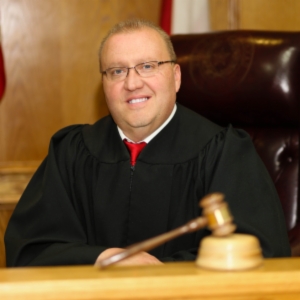Refiled lawsuit challenges justice of the peace's courtroom prayer program

The Freedom from Religion Foundation has refiled a lawsuit against a Texas justice of the peace who solicits chaplains to lead a courtroom prayer service.
The suit was filed Wednesday against Judge Wayne Mack in his personal and official capacities after a federal judge ruled in September that the foundation had sued the wrong parties. Mack was named only in his official capacity in the prior suit along with Montgomery County, Texas, which did not have authority over the elected judge. The Houston Chronicle has coverage.
The new suit, filed in federal court in Houston, says the Montgomery County judge’s program is an endorsement of Christianity that violates the establishment clause.
According to a press release, Mack’s courtroom prayer sessions are “a practice not replicated by any other court in the country.”
Mack told the Houston Chronicle that “every mosque, temple and synagogue” is represented among the more than 60 chaplains who appear in his courtroom. A lawyer for the First Liberty Institute, which is representing Mack, told the Houston Chronicle that the foundation continues to harass Mack, despite repeated losses.
“It’s ridiculous that a group from Wisconsin would continue to fight invocations similar to those the Supreme Court of the United States has twice ruled are constitutional,” said Hiram Sasser, general counsel for First Liberty Institute. The two Supreme Court cases involved a town council in New York and lawmakers in Nebraska.
Plaintiffs in the new suit are the Freedom from Religion Foundation and a “John Roe” lawyer who appeared in Mack’s courtroom at least 20 times to represent clients in at least 45 matters. Roe felt compelled to remain in the courtroom during prayers because of his concern that leaving would cause Mack to be biased against him and his clients, according to the suit.
Roe later decided he didn’t want to compromise his beliefs by continuing to participate in the prayers, so he has elected to no longer represent clients before Mack, the suit says. He has declined business to avoid appearances before the judge and sometimes brings cases in a district court with concurrent jurisdiction to avoid the courtroom prayers. The district court has higher fees and a generally slower docket.
When Mack campaigned for justice of the peace he ran on a platform of instituting Christian values, according to the suit. His campaign flyers emphasized that he “majored in theology” and was a “Sunday school teacher and lay youth minister for 15 years.” He was elected and sworn in as a justice of the peace in May 2014.
Soon after taking the bench, Mack instituted his court chaplaincy program. In a training session for newly recruited chaplains, an opening slide featured a large Christian cross. A qualifications section said chaplains should “maintain biblical, ethical and moral standards.” Chaplains giving prayers were given badges with a Christian cross to wear.
 Judge Wayne Mack. Photo from the Montgomery County, Texas, Justice of the Peace Precinct 1.
Judge Wayne Mack. Photo from the Montgomery County, Texas, Justice of the Peace Precinct 1.
When he began the program, Mack would enter the courtroom and announce that everyone should remain standing for the prayer, the suit said. He then announced, “If any of you are offended by that you can leave into the hallway and your case will not be affected.” Then, the chaplain would “read from the Christian Bible for five to eight minutes,” followed by a prayer and the Pledge of Allegiance and the Texas Pledge of Allegiance to the state flag, according to the suit.
The Freedom from Religion Foundation filed a complaint about Mack’s chaplain program with the Texas State Commission on Judicial Conduct in October 2014. The commission opted not to discipline Mack in November 2015, saying it had no authority to decide whether the courtroom prayers violated the establishment clause.
But the commission cautioned Mack to end his current practice or substitute a practice consistent “with the perfunctory acknowledgement of religion that is accepted and employed by the United States Supreme Court and the Texas Supreme Court,” the lawsuit said.
After a pro se litigant filed a new complaint in May 2016 with the commission, the commission’s executive director and the lieutenant governor of Texas asked the state attorney general for a legal opinion on Mack’s practices.
Attorney General Ken Paxton found that there was probably no establishment clause violation in August 2016. But Paxton relied on assertions about the program made by the lieutenant governor that didn’t reflect the actual origin and purpose of the program, the lawsuit alleges.
Mack has revised the program, the suit says. He has removed the cross from the chaplain handbook and from chaplain badges. Some chaplains not affiliated with the program are sometimes added to the schedule. A bailiff or court clerk is supposed to announce the prayer and give people a chance to leave before Mack enters the courtroom.
But the lawsuit still sees problems with that approach. The courtroom doors are magnetically locked during the prayer, and people who want to reenter afterward “would need to draw attention to themselves by knocking on the courtroom doors,” the lawsuit says.
Mack asked for the magnetic locks and is the only justice of the peace in Montgomery County who locks his courtroom doors in this manner, the suit says.
“Because the docket is called prior to the prayer, all attorneys present in the courtroom have been logged,” according to the suit. “Judge Mack therefore has access to a record of those attorneys present in the courtroom when the invitation to leave the courtroom during the prayer practice is announced.”



